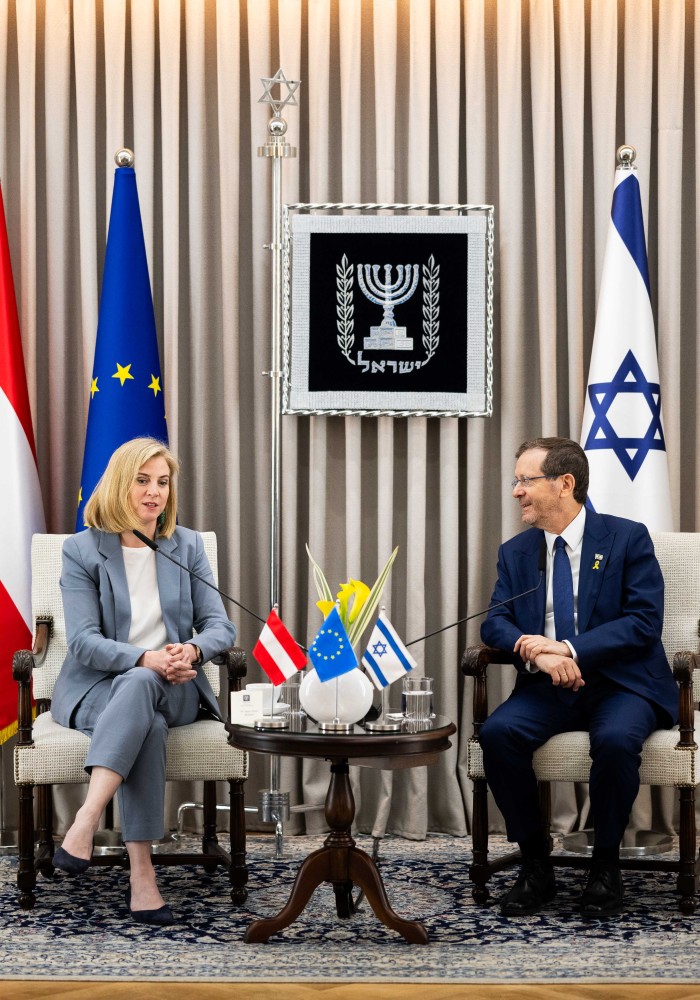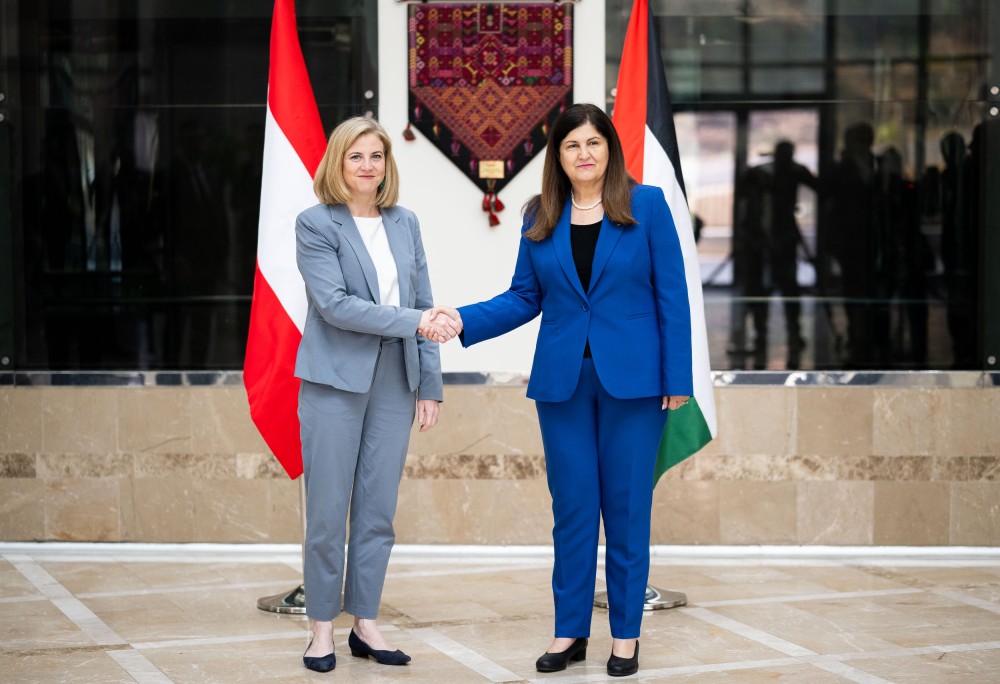Austria's Meinl-Reisinger Intensifies Middle East Diplomacy and Calls for De-Escalation and Two-State Solution
Austria has ramped up its diplomatic efforts in the Middle East over the last few days, while also massively increasing its humanitarian support for the suffering civilian population in Gaza. Foreign Minister Beate Meinl-Reisinger (NEOS) completed a trip lasting several days that took her to Cyprus, Egypt, Jordan, Israel, and Ramallah in the Palestinian territories to promote de-escalation, a ceasefire, and a sustainable two-state solution.
 Austrian Foreign Minister Beate Meinl-Reisinger visited the impact site of Iranian missiles in Bat Yam with her Israeli counterpart, Gideon Saar (l.), and the mayor of Bat Yam, Tzvika Brot (r.). / Picture: © BMEIA Bundesministerium für Europa, Integration und Äußeres / Michael Gruber / Flickr Attribution 2.0 Generic (CC BY 2.0 DEED)
Austrian Foreign Minister Beate Meinl-Reisinger visited the impact site of Iranian missiles in Bat Yam with her Israeli counterpart, Gideon Saar (l.), and the mayor of Bat Yam, Tzvika Brot (r.). / Picture: © BMEIA Bundesministerium für Europa, Integration und Äußeres / Michael Gruber / Flickr Attribution 2.0 Generic (CC BY 2.0 DEED)


Meinl-Reisinger's trip, which took her from Cyprus to Egypt and Jordan to Israel and Ramallah, was the first by an Austrian foreign minister to Israel since the recent escalation between Israel and Iran. The foreign minister emphasized the urgency of returning to diplomacy and the negotiating table. The key messages at all stops were the urgent need for a ceasefire in Gaza, the immediate release of all hostages, and unrestricted access for humanitarian aid. Austria insists on compliance with international humanitarian law and advocates at the EU level for maintaining dialogue with Israel instead of suspending the Association Agreement.
Cyprus: Bridge to the Middle East and partner in migration issues
Foreign Minister Meinl-Reisinger's first stop took her to Nicosia, where she met with her Cypriot counterpart Konstantinos Kombos. Given the escalation in the Middle East in the weeks before this visit, it was particularly significant that it took place in the EU country most directly affected. Meinl-Reisinger emphasized: "The EU must work to de-escalate the situation. For me, there is no question that Iran must not be allowed to possess nuclear weapons. But I am convinced that in the long term, this can only be achieved through a negotiated solution.“ She highlighted Cyprus as a ‘beacon’ that is often the first to intercept EU crises, while Kombos described the island as a ”bridge to the wider Middle East."
Met with my colleague Konstantinos Kombos, Foreign Minister of Cyprus, in Nicosia today. Discussed many topics that are of relevance for our common European security. Emphasized that de-escalation in the #Middle East is urgently needed / must be the way forward. Agreed that we…
— Beate Meinl-Reisinger (@BMeinl) June 27, 2025
Another key topic of discussion was the fight against irregular migration. Meinl-Reisinger noted that Austria and Cyprus are among the EU countries most affected and that European solidarity is essential. She called for the full implementation of the new EU Asylum and Migration Pact by June 2026. This pact, which was adopted in May 2024 and is due to come into full effect by mid-2026, introduces new rules for border procedures and a solidarity mechanism among EU countries. She expressed openness to “pragmatic approaches” such as those practiced in Cyprus to curb irregular migration through fake visas or incentives for voluntary departure. Regarding Russia's war of aggression against Ukraine, both sides reaffirmed their support for Ukraine and intensified pressure on Russia.
Egypt: An anchor of stability and an indispensable partner
Meinl-Reisinger then traveled to Cairo, where she met with her Egyptian counterpart Badr Abdelatty. She described Egypt not only as a popular travel destination and the second most important export market in Africa, but also as an “anchor of stability in a volatile region.” The focus was on the excellent bilateral relations, which are to be further expanded through the signing of an agreement on annual political consultations and an air transport agreement. Economic cooperation opportunities exist in areas such as water management, renewable energies, and infrastructure. Egypt is an indispensable partner for Austria and the EU in the fight against irregular migration. Both sides agreed that Israel and Iran must maintain the ceasefire and that further escalation must be avoided at all costs: “De-escalation and diplomacy are the order of the day.” An important item on the agenda was a visit to the Red Crescent's operations room, where relief supplies for Gaza are collected and packed.
Vielen Dank, Außenminister Badr Abdelatty, für die Gastfreundschaft in Ägypten! Wir sind vereint in unserem Einsatz für einen stabileren, sichereren und wohlhabenderen Nahen Osten.Wir haben uns darauf verständigt, unsere bilateralen Beziehung weiter vertiefen zu wollen. Heute… pic.twitter.com/Xk7KwPmC8h
— Beate Meinl-Reisinger (@BMeinl) June 28, 2025
Jordan: Pole of dialogue and growing economic partner
Foreign Minister Meinl-Reisinger continued her Middle East trip in Jordan, where she met with Jordanian Deputy Prime Minister and Foreign Minister Ayman al-Safadi. Meinl-Reisinger emphasized: “Jordan is a pole of stability, dialogue, and diplomacy in the region and an important partner for Austria.” Cooperation in disaster control, security, economy, and culture has been further expanded in recent years, with an impressive 12 percent increase in Austrian exports to Jordan in 2024. Both sides agreed that de-escalation and diplomacy are the order of the day: "Together, we advocate dialogue instead of further escalation. What the region finally needs is a return to the negotiating table."
Thank you to Foreign Minister Ayman Safadi for the friendly and open exchange in #Amman. has been an anchor of stability for years in a region marked by conflict – prudent, humanitarian, and reliable. Today we discussed paths toward a lasting ceasefire in #Gaza, prospects for…
— Beate Meinl-Reisinger (@BMeinl) June 29, 2025
Israel: Commitment to security and demand for international humanitarian law
Meinl-Reisinger continued her trip in Israel. It was the first visit by a foreign minister to Israel since the recent escalation between Israel and Iran. During her talks with her Israeli counterpart Gideon Sa'ar, President Yitzhak Herzog, and a visit to the Knesset, Meinl-Reisinger emphasized: "A visit to Israel is a visit to friends. Austria stands firmly alongside the Israeli people and is committed to Israel's sovereignty and right to exist.“ At the same time, she was clear in her demands: ”Now is the time to bring about peace in Gaza through diplomacy and political efforts. A ceasefire is needed, as well as the release of hostages and the full resumption of humanitarian aid for the suffering civilian population."
The suffering of civilians in Gaza is straining Europe's relationship with Israel, according to Meinl-Reisinger. She also used the meeting to express her concern about the ongoing settlement expansion and violence by settlers in the West Bank, as well as the withholding of tax revenues for the Palestinian Authority. In the long term, she said, there is no alternative to a two-state solution based on international law. During a visit to Hostage Square, she met with the released Austrian-Israeli hostage Tal Shoham and laid a wreath at the Yad Vashem Holocaust Memorial, underscoring Austria's commitment to protecting Jewish life and combating anti-Semitism.
Ramallah: Support for the two-state solution and strengthening of the PA
As part of her trip to the Middle East, Foreign Minister Meinl-Reisinger finally met with the Foreign Minister of the Palestinian Authority (PA), Varsen Aghabekian Shahin, in Ramallah in July. She reaffirmed Austria's full support for a two-state solution based on international law and a strong and efficient Palestinian Authority. Austria has been actively contributing to this for decades, both within the framework of the EU and through bilateral development cooperation. The Austrian Development Agency (ADA) has maintained an office in Ramallah for over 25 years and supports projects in institutional capacity building, health care, and the promotion of women and young people (e.g., the AMALI project).
Meinl-Reisinger made it clear that Gaza must remain Palestinian and that the terrorist organization Hamas must no longer play any role. Disarmament and dissolution are essential. She also condemned the violence of radical Israeli settlers, which is clearly illegal and hinders a political solution. Aghabekian-Shahin described this as “acts of terror” and asked Austria to take concrete measures against Israel's actions. She also spoke out in favor of suspending the EU Association Agreement with Israel.
80 years of the United Nations: Austria's commitment to multilateralism
Parallel to the Middle East efforts, the 80th anniversary of the signing of the United Nations Charter was celebrated in Vienna. Foreign Minister Meinl-Reisinger emphasized the importance of the UN as a “beacon of hope” in times of geopolitical competition and global challenges. Austria joined the UN exactly 70 years ago and has since developed into a reliable advocate of effective multilateralism and one of the four official UN seats. Austria is ready to take responsibility for common security – in particular through its candidacy for the UN Security Council in 2027/2028.
Three million euros for Gaza – criticism of alternative aid mechanisms
In view of the catastrophic humanitarian situation in Gaza, the Austrian federal government has made a further three million euros available to the International Committee of the Red Cross (ICRC) from the Foreign Ministry's Foreign Disaster Fund. Chancellor Christian Stocker and Vice-Chancellor Andreas Babler had previously emphasized Austria's support for Gaza and underlined the need for a ceasefire and the release of all hostages, as the Palestinian civilian population should not have to pay the price for Hamas' terror. The payment will be made through the Austrian Development Agency (ADA), Austria's agency for development cooperation, which has been financing and supporting development programs and projects since 2004 and is considered an instrument of Austria's humanitarian tradition. Since October 2023, Austria has contributed a total of over 63 million euros to support the civilian population in the region.
The ICRC provides life-saving assistance on the ground by supplying people with drinking water, food, emergency shelter, and primary medical care. It also works to protect health facilities and personnel and has, among other things, set up a field hospital in Rafah and provides information about unexploded ordnance.
Austria's clear stance on aid distribution is particularly noteworthy. Foreign Minister Meinl-Reisinger emphasized in Jerusalem that the ICRC is a “reliable partner,” while explicitly classifying the controversial Gaza Humanitarian Foundation (GHF) as “unreliable.” The GHF, an initiative launched in early 2025 with US and Israeli support, has been criticized internationally for politicizing humanitarian aid and for not being a neutral partner. Numerous humanitarian organizations, including the United Nations, refuse to cooperate with the GHF and accuse it of militarizing aid distribution and even causing deadly incidents.
A new era in Austrian foreign policy: pragmatic, principled, and committed
Foreign Minister Beate Meinl-Reisinger's intensive trip to the Middle East marks a remarkable high point in recent Austrian foreign policy. Her approach of combining empathy for the humanitarian plight with clear words to all parties to the conflict demonstrates a pragmatic yet principled stance. The “new MFA” under her leadership demonstrates that Austria takes its role as a neutral state and reliable partner for humanitarian aid and international rule of law seriously, even in highly complex and volatile regions.
By seeking direct dialogue with all actors while clearly distinguishing necessary humanitarian aid from politically motivated initiatives, Meinl-Reisinger has strengthened Austria's position as a credible mediator and supporter of international law. Her trip is a clear signal that Austria wants to actively contribute to de-escalation in times of global upheaval and promote long-term political solutions such as the two-state solution to enable peace and security in the Middle East. The extent to which this new approach will hold up in the new world, despite its refreshing nature, remains to be seen.



